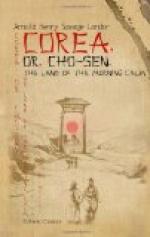We had hardly come to a standstill when a curious-looking being, who had come to meet the steamer in a boat, climbed up the rope-ladder which had been let down on the starboard side and came on board. He was a European.
“Do you see that man?” a voice whispered in my ear. “He is a body-snatcher.”
“Nonsense,” I said; “are you joking, or what?”
“No, I am not; and, if you like, I will tell you his story at luncheon.” And surely what better time could be chosen for a “body-snatching” story than “luncheon.” Meanwhile, however, I lost not my chance, and while conversing with somebody else, the snatcher found himself “snatched” in my sketch-book. It is not every day that one comes across such individuals! I went to speak to him, and I must confess that whether he had as a fact troubled the dead or not, he was none the less most courteous and polite with the living. He had, it is true, at times somewhat of a sinister look in his face; but for his unsteady eyes, you might almost have put him down as a missionary. He informed me that codfish was to be had in great abundance at Fusan, and that the grain export was almost entirely done by the Japanese, while the importation of miscellaneous articles was entirely in the hands of the Chinese.
Fusan is situated at the most south-westerly extremity of the province of Kiung-sang, which words, translated into English mean, “polite compliment.” The kingdom of Corea, we may here mention, is divided into eight provinces, which rejoice in the following names: Kiung-sang-do,[1] Chulla-do, Chung-chon-do, Kiung-kei-do, Kang-wen-do, Wang-hai-do, Ping-yan-do, Ham-kiung-do. The province in which Fusan is situated is, without exception, the richest in Corea after that of Chulla, for it has a mild climate and a very fertile soil. This being the case, it is not astonishing to find that the population is more numerous than in most other districts further north, and also, that being so near the Japanese coast, a certain amount of trading, mostly done by junks, is continually being transacted with the Mikado’s subjects on the opposite shores. Fusan has been nominally in the hands of the Japanese from very ancient times, although it was only in 1876 that a treaty was concluded by which it was opened to Japanese trade. The spot on which the settlements lie is pretty, with its picturesque background of high mountains and the large number of little islands rising like green patches here and there in the bay. Maki, the largest island, directly opposite the settlement, is now used as a station for breeding horses of very small size, and it possesses good pastures on its high hills. In the history of the relations between Corea and Japan this province plays indeed a very important part, for being nearer than any other portion of the kingdom to the Japanese shores—the distance being, I believe, some 130 miles between the nearest points of the two countries—invasions have




